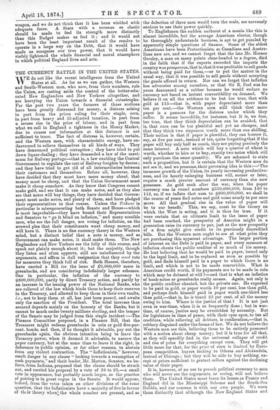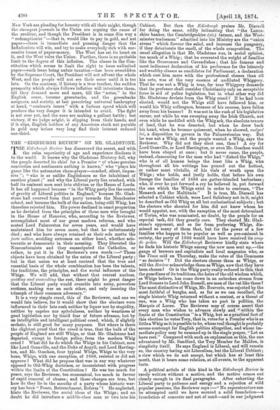THE CURRENCY BATTLE IN THE UNITED STATES.
WE do not like the recent intelligence from the United States at all. As far as we can gather, the Western and South-Western men, who now, from their numbers, rule the Union, are casting aside the control of the better-edu- cated New Englanders and New Yorkers altogether, and are hurrying the Union towards a financial catastrophe. For the past two years the farmers of those sections have been greatly distressed for money, a distress arising in part from the prices ruling for their staple, corn, in part from heavy and ill-adjusted taxation, in part from a severe rise in the price of labour, and in part from what we call in England a tightness in the Money Market, due to causes our information at this distance is not sufficient to trace. The fact of distress is, however, certain, and the Western men, with characteristic energy, have en- deavoured to relieve themselves in all kinds of ways. They have denounced political corruption ; they have tried to put down liquor-dealing ; they have demanded a law of the maxi- mum for Railway portage—that is, a law enabling the Central Government to regulate the cost of Railway freights by decree ; and they have tried to get rid of all intermediaries between their customers and themselves. Before all, however, they have decided that they must have more money about, that money must be cheap, and that the Union Government must make it cheap somehow. As they know that Congress cannot make gold, and see that it can make notes, and as they also see that notes will buy things, they have decided that Govern- ment must make notes, and plenty of them, and have pledged their representatives to that course. Unless the Tribune in particular is misrepresenting both Senate and House—which is most improbable—they have bound their Representatives and Senators to "go it blind on inflation," and many sensible men, who see the full danger, are voting for inflation, on the avowed plea that their constituents want cheap money, and will have it. There is no fine currency theory in the Western mind, but a distinct belief that a note is money, and as Government can make notes, it shall make them. The New Englanders and New Yorkers see the folly of this course, and speak out plainly enough about it; but the majority, though they listen and often approve, still are uninfluenced by the arguments, and affirm in dull resignation that they must vote for measures they think full of risk. Both Houses, therefore, have carried a Bill for the issue of £9,000,000 more in greenbacks, and are considering indefinitely larger schemes. One in particular, the inflation of the currency to $800,000,000, partly by direct Treasury action, and partly by an increase in the issuing power of the National Banks, who are relieved of the law which binds them to keep their reserves in the Treasury, and allowed to keep them in their own vaults, .e., not to keep them at all, has just been passed, and awaits only the sanction of the President. The total increase thus secured depends mainly on the honesty of the Banks, but it cannot be much under twenty millions sterling, and the temper of the Senate may be judged from this single incident :—The Finance Committee proposed, in a Finance Bill, that the Treasurer might redeem greenbacks in coin or gold five-per- cent. bonds, and then, if he thought it advisable, pay out the greenbacks again, the obvious intention being to leave the Treasury power, when it deemed it advisable, to narrow the paper currency, but at the same time to leave it the right, in deference to public opinion, or for other reasons, to abstain from any violent contraction. The "Inflationists," however, smelt danger in any clause "looking towards a resumption of cash payments," and their leader, Mr. Morton, Senator, we be- lieve, from Indiana, proposed that the clause should be struck out, and carried his proposal by a vote of 28 to 23,—a small vote in appearance, but probably much larger, as the practice of pairing is in great vogue in the Senate. It would appear, indeed, from the votes taken on other divisions of the same question, that the Inflationists have a majority of five in favour of tluir theory when the whole number are present, and as i
the defection of three men would turn the scale, are nervously anxious to use their power quickly.
To Englishmen the sudden outburst of a mania like this is almost incredible, but the average American elector, though he thoroughly understands business, is apt to get puzzled by apparently simple questions of finance. Some of the ablest Americans have been Protectionists, as Canadians and Austra- lians now are, and we cannot forget that the late Mr. Horace Greeley, a man on many points clear-headed to a degree, died in the faith that if the exports exceeded the imports the country was prosperous, that is, that it was profitable to sell goods without being paid for them,—or to put the matter in the usual way, that it was possible to sell goods without accepting the goods offered in return. Nor can we forget that inflation has advocates among ourselves, or that Sir R. Peel was for years denounced as a robber because he would endure no currency not based on instant convertibility on demand. We believe it on all the evidence to be but too true, that with gold at 113—that is, with paper depreciated more than ten per cent.—the Western men still think that more paper is a panacea for the distress under which they suffer. It seems incredible, for instance, but it is, we fear, too true, that they think depreciation can be avoided, that is, that corn can be too plentiful and yet no cheaper, and that they think two sixpences worth more than one shilling. Their notion is that if paper is plentiful, they can borrow it, say, at five per cent., instead of ten, quite forgetting that if the paper will buy only half as much, they are paying precisely the same interest. A note which will buy a quarter of wheat is worth, whether to hire or to buy, exactly two notes which will only purchase the same quantity. We are ashamed to state such a proposition, but it is certain that the Western men do not see it, and we presume, their governing idea is this:—'The immense growth of the Union, its yearly increasing productive- ness, and its hourly enlarging business will, sooner or later, require a much greater amount of currency than she now possesses. As gold sank after the war, when the paper currency was in round numbers $350,000,000, from 140 to 112, so, if we inflate that sum to $800,000,000, we shall in the course of years find notes and gold come nearly to par once more. All that gradual rise in the value of paper will be to our benefit.' This, we say, must be the theory on which the West is acting, and it is thus far true. If it were certain that an ultimate limit to the issue of paper had been reached, the prosperity of America might in a generation raise its currency to par, just as the new prosperity of a firm might give credit to its previously discredited bills. But the Western men ought to see at what price they are purchasing this apparent advantage. The larger portion of interest on the Debt is paid in paper, and every measure of inflation cheats the public creditor of so much of his money. He lent believing that he would be paid in paper, issued only to the legal limit, and to be replaced as soon as possible by gold, and finds himself paid in a paper to which there is no limit, and which is not to be made convertible. What is American credit worth, if its payments are to be made in coin which may be debased at will ?—and that is what an inflation of bank-notes or greenbacks really means. Again, not only is the public creditor cheated, but the private one. He expected to be paid in gold, or paper worth 10 per cent, less than gold, and perhaps finds himself paid in paper worth one-third less than gold,—that is, he is taxed 23 per cent. of all the money owing to him. Where is the justice of that ? It is not just even in war-time, when it is 80 frequently done ; but in war- time, of course, justice may be overridden by necessity. But for legislators in time of peace, with their eyes open, to tax all creditors, while relieving all debtors, is confiscation,—that is, robbery disguised under the forms of law. We do not believe the Western men see this, believing them to be entirely possessed
with a notion about cheap money ; but it is true for all that, as they will speedily find in the universal collapse of credit and rise of price for everything except corn. They will get little more for that, for the price of corn is limited by Euro- pean competition, buyers looking to Odessa and Alexandria, instead of Chicago ; but they will be able to buy nothing, ex- cept at prices sufficient to protect sellers against the declining value of their paper.
It is, however, of no use to preach political economy to men who will never see the arguments, or seeing, will not believe
them. The United States must learn its lesson as France and England did in the Mississippi Scheme and the Smith-Sea Bubble, and our concern is with our own people. We warn them distinctly that although the New England States and New York are pleading for honesty with all their might, though the strongest journals in the Union are arguing the cause of the creditor, and though the President is in some dim way a " redemptionist "—that is, would like to pay in gold, and not paper—there is immediate and pressing danger that the Inflationists will win, and try to make everybody rich with suc- cessive issues of paper-money. The West has set its heart on it, and the West rules the Union. Further, there is no probable limit to the degree of this inflation. The clause in the Con- stitution which seems to limit the right to issue unlimited paper—such issue being unfair taxation—has been overridden by the Supreme Court, the President will not affront the whole West, and the people will not see their error until it is too late. On the contrary, if history is a true teacher, the sudden prosperity which always follows inflation will intoxicate them, till they demand more and more, till the "notes," in the English sense, become greenbacks, and the greenbacks assignats, and society, at last perceiving universal bankruptcy at hand, "contracts issues" with a furious speed which will produce the very danger it is intended to avoid. The fight is not over yet, and the sane are making a gallant battle ; but victory, if we judge aright, is slipping from their hands, and if it slips, English holders of any American stock not payable in gold may before very long find their interest reduced one-third.



































 Previous page
Previous page